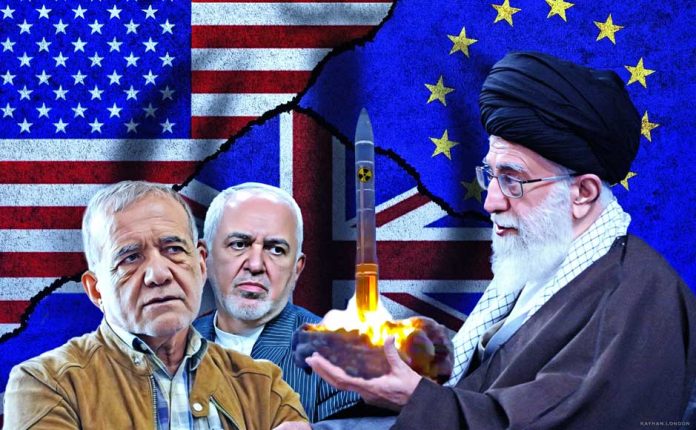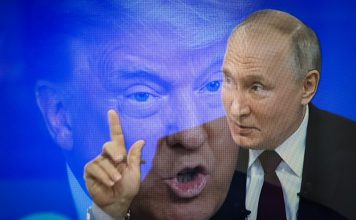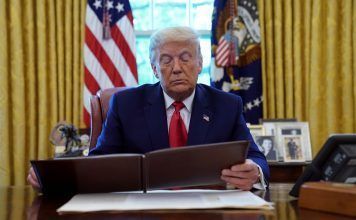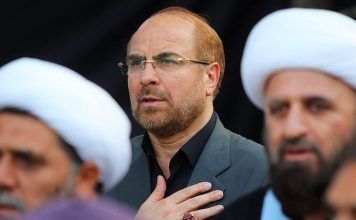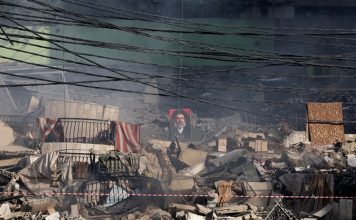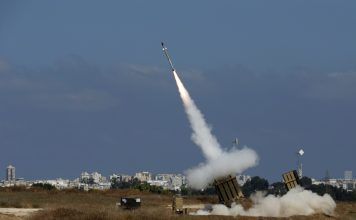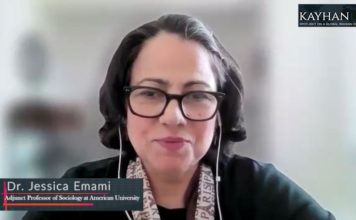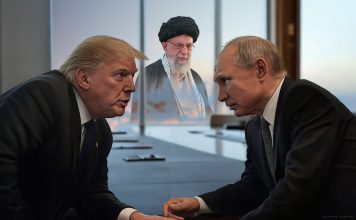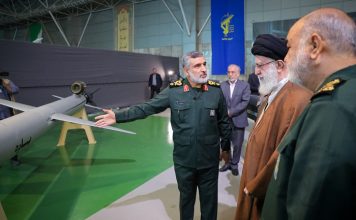By Ahmad Rafat
Weeks after the election of Masoud Pezeshkian as the new Iranian President, the Islamic Republic is facing significant challenges on the global stage.
One critical factor that could push Iran into further international isolation is the possibility of Donald Trump winning the upcoming November U.S. presidential elections. This scenario could exacerbate the Islamic Republic’s already strained international relations, potentially spelling a more confrontational US approach toward Iran.
In Europe, Estonia’s former Prime Minister Kaja Kallas is replacing Josep Borrell as the new High Representative of the Union for Foreign Affairs and Security Policy and Vice-President of the European Commission. And Dutch ex-Premier Mark Rutte will take over as NATO Secretary General, replacing Jens Stoltenberg in October. These high-profile appointments pose new challenges to the new Pezeshkian government and could spell a shift in Iran’s foreign policy.
Yet Pezeshkian, influenced by Supreme Leader Ali Khamenei, is pursuing the strategies of previous governments. Although he has adopted a different rhetoric in his interactions with Western nations and regional countries, the shift in language and tone is unlikely to significantly change diplomatic relations.
For the Islamic Republic, the international landscape is changing.
In the US, the Republican Vice-Presidential candidate J.D. Vance has recently altered his views on the Islamic Republic’s influence in the region and its nuclear initiatives. Previously, Vance opposed escalating tensions or engaging in military conflict with the Islamic Republic. However, in a recent interview with Fox News, he adopted a markedly different tone and perspective.
Vance praised Trump for the 2020 assassination of Lieutenant General Ghasem Soleimani, the former commander of the Islamic Revolutionary Guards Corps Qods Force (IRGC-QF), who was killed in a U.S. drone strike on Baghdad International Airport on Jan. 3, 2020.
“If you are going to punch the Iranians, you punch them hard,” Vance remarked.
In the same Fox News interview, Vance argued that U.S. President Joe Biden should grant Israel more freedom of action “until the conflict in Gaza concludes,” suggesting that this would stabilize the situation through a peace agreement between Israel and Saudi Arabia.
The elections of Kaja Kallas at the EU and Mark Rutte at NATO are both reactions to Russia’s aggressive actions towards Ukraine. Rutte and Kallas have been consistently critical of Russian President Vladimir Putin, particularly on the ongoing conflict in Ukraine. Both leaders have raised alarms about Iran’s nuclear activities and the supply of drones and other weaponry to Russia for the conflict.
In the meantime, the nuclear program of the Islamic Republic is advancing at an alarming rate, as highlighted in the most recent report from the International Atomic Energy Agency (IAEA). U.S. Secretary of State Antony Blinken’s warning that the program is merely one or two weeks away from achieving the capability to construct a nuclear bomb is a critical issue that the international community cannot afford to overlook.
During the IAEA Board of Governors’ meeting on June 5, the three European nations, Germany, France, and the UK, successfully passed a resolution censoring Iran with 20 votes in favor, while 12 members abstained from voting. Only China and Russia opposed the resolution. This action was taken in response to Iran’s ongoing unwillingness to engage cooperatively with the IAEA in addressing unresolved matters concerning undeclared nuclear materials found at various sites within Iran.
ANALYSIS: Iran’s New President Masoud Pezeshkian Is No Moderate
The resolution directed the case to the UN Security Council for prompt examination. During the IAEA meeting, the Troika (European group) cautioned Iran that non-compliance with the nuclear agency’s directives could trigger the “snapback mechanism.” This mechanism would reinstate previously suspended UN resolutions on Iran and effectively invalidate the JCPOA, potentially leading to a more isolated Iran in the international community.
The Troika is a term for the single decision group created by three entities: the European Commission (EC), the European Central Bank (ECB), and the International Monetary Fund (IMF).
Paragraphs 36 and 37 of the JCPOA’s “Dispute Resolution Mechanism” enable the Joint Commission — which includes representatives from China, France, Germany, Iran, Russia, and the UK — and the EU High Representative for Foreign Affairs to meet at a senior policy official level. This mechanism addresses any disputes that arise and aims to reach a resolution that satisfies the party raising the complaint within an initial timeframe of 15 days.
If the commission cannot resolve the identified issues, the case will be escalated to the foreign ministers of the countries involved in the JCPOA. These ministers will have an additional 15 days to address and rectify the problems. The joint commission is allotted another five days to assess the disputes and propose a resolution.
Should the aggrieved party remain dissatisfied after these 35 days, the issue can be escalated to the UN Security Council, citing a severe breach of the agreement. The Security Council must vote within 30 days on whether to maintain or lift the suspension of sanctions, which means that sanctions initially suspended in 2015 could be reinstated. None of the member states will have veto power over this decision.
In mid-June, during a meeting held in southern Italy, the G7 industrialized nations issued a resolution denouncing the Islamic Republic of Iran’s nuclear program. This resolution, along with their expressed concern regarding Iran’s collaboration with Russia in the ongoing conflict in Ukraine, could further isolate Iran on the international stage. The military partnership between Iran and Russia is expected to be a significant topic of discussion for the EU and NATO in the upcoming weeks, potentially leading to more pressure on Iran to change its foreign policy.
In this context, Iran’s Supreme Leader Ali Khamenei chose Pezeshkian, described as a “moderate” and a “reformist,” to replace the late Ebrahim Raisi, who was known as a hardliner and “extremist.” Pezeshkian won in the runoff election held on July 5. This development introduces new challenges for the Islamic Republic’s endurance within the international political landscape.
The government that Pezeshkian will form in August will certainly not prioritize the many challenges that the Iranian population faces, including high unemployment and hyperinflation. It will overlook the uprising of Iranian women protesting the mandatory hijab, as well as the repression and executions occurring within the country.
Mohammad Javad Zarif, who served as foreign minister during both terms of President Hassan Rouhani (from 2013 to 2021), played a crucial role in the 2015 nuclear deal. He is expected to play a significant role in shaping Pezeshkian’s cabinet, aiming to mitigate the Islamic Republic’s isolation and relieve tensions on both regional and international fronts.
However, it would be difficult for Pezeshkian’s administration to modify the Islamic Republic’s foreign policy to reduce tensions with Western nations and other countries in the Middle East.
In an opinion piece titled “My Message to the New World,” featured in the July 12 edition of the Tehran-based English-language Tehran Times newspaper, Pezeshkian discussed maintaining earlier policies, though he articulated them in a more subdued manner compared to the rhetoric employed by Raisi’s administration.
In this article, which is believed to be written by Zarif, the president-elect outlined the fundamental principles guiding the foreign policy of the Islamic Republic.
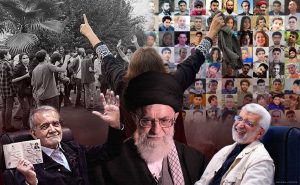
Referencing various countries within the region, Pezeshkian said: “We look forward to cooperating with Turkey, Saudi Arabia, Oman, Iraq, Bahrain, Qatar, Kuwait, the United Arab Emirates, and regional organizations to deepen our economic ties, bolster trade relations, promote joint-venture investment, tackle common challenges, and move towards establishing a regional framework for dialogue, confidence building and development.”
After his election, Pezeshkian’s first interaction with a foreign political leader was with Hezbollah from Lebanon. In this message, he emphasized the continuous backing of the Islamic Republic for this group, which has been classified as a terrorist organization by many Western countries and has an extensive record of engaging in terrorist activities.
After his communication with the Lebanese Hezbollah leader Hassan Nasrallah, Pezeshkian spoke to Ismail Haniyeh, leader of Hamas’s political wing. He also engaged with leaders from various other militant organizations, including the Yemeni Houthis and the Popular Mobilization Forces (PMF) in Iraq. He praised these groups for their military actions against Israel and urged them to persist in their attacks on Israeli targets.
Like previous administrations, Pezeshkian emphasized Iran’s special relationship with Russia and China.
“Our region has been plagued for too long by war, sectarian conflicts, terrorism and extremism, drug trafficking, water scarcity, refugee crises, environmental degradation, and foreign interference. It is time to tackle these common challenges for the benefit of future generations. Cooperation for regional development and prosperity will be the guiding principle of our foreign policy,” Pezeshkian noted in the Tehran Times opinion piece.
“China and Russia have consistently stood by us during challenging times. We deeply value this friendship. Our 25-year roadmap with China represents a significant milestone towards establishing a mutually beneficial ‘comprehensive strategic partnership,’ and we look forward to collaborating more extensively with Beijing as we advance towards a new global order,” Pezeshkian noted.
“Russia is a valued strategic ally and neighbor to Iran, and my administration will remain committed to expanding and enhancing our cooperation. We strive for peace for the people of Russia and Ukraine, and my government will stand prepared to actively support initiatives to achieve this objective. I will continue prioritizing bilateral and multilateral cooperation with Russia, particularly within frameworks such as BRICS, the Shanghai Cooperation Organization, and Eurasian Economic Union,” Pezeshkian argued.
BRICS is an intergovernmental coalition that includes Brazil, Russia, India, China, South Africa, Iran, Egypt, Ethiopia, and the United Arab Emirates. Its goal is to foster economic cooperation and political dialogue among its member states.
Regarding the United States and European nations, Pezeshkian reiterated long-standing criticisms that have been discussed in Tehran for many years. These critiques do not introduce new elements.
“Iran’s relations with Europe have known its ups and downs. After the United States’ withdrawal from the JCPOA (the Joint Comprehensive Plan of Action) in May 2018, European countries made eleven commitments to Iran to try to salvage the agreement and mitigate the impact of the U.S.’ unlawful and unilateral sanctions on our economy, Pezeshkian said.
In the past two years, Europe has implemented a series of sanctions targeting Iran, primarily motivated by concerns over the Islamic Republic’s human rights abuses, the expansion of nuclear and weapons programs, and the support for terrorist organizations operating within the region.
Describing the sanctions as “missteps” by the EU, Pezeshkian expressed hope for a more “constructive dialogue” with the European countries.
IRGC Commander Says Tehran Could Review ‘Nuclear Doctrine’ Amid Israeli Threats
“Despite these missteps, I look forward to engaging in constructive dialogue with European countries to set our relations on the right path based on principles of mutual respect and equal footing. European countries should realize that Iranians are a proud people whose rights and dignity can no longer be overlooked,” Pezeshkian said in the Tehran Times opinion piece.
“There are numerous areas of cooperation that Iran and Europe can explore once European powers come to terms with this reality and set aside self-abrogated moral supremacy coupled with manufactured crises that have plagued our relations for so long,” Pezeshkian argued.
Pezeshkian also reiterated the Islamic Republic’s policy towards the U.S.
“The U.S. also needs to recognize the reality and understand, once and for all, that Iran does not and will not respond to pressure. The U.S. deliberately chose to escalate hostilities by waging not only an economic war against Iran but also engaging in state terrorism by assassinating General Ghasem Soleimani, a global anti-terrorism hero known for his success in saving the people of our region from the scourge of ISIS and other ferocious terrorist groups,” Pezeshkian argued.

